
British postcard by W & G Ltd., no. S 6. Photo: George Hurrell, 1932 / MGM.

French postcard by Ets. La Deley, Paris for Gaumont-Metro-Goldwyn. Photo: Metro Goldwyn. Caption: a new screen star.

French postcard by Europe, no. 618. Photo: Metro-Goldwyn-Mayer.
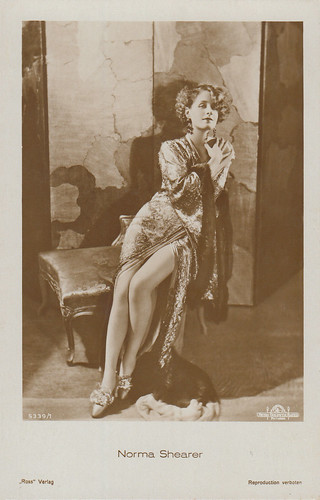
German postcard by Ross Verlag, no. 5339/1, 1930-1931. Photo: George Hurrell / Metro-Goldwyn-Mayer. Norma Shearer in Let Us Be Gay (Robert Z. Leonard, 1930). Collection: Marlene Pilaete.

Dutch postcard, no. 21. Photo: Metro-Goldwyn-Mayer.

German postcard by Ross Verlag, no. 4514/1, 1929-1930. Photo: Metro-Goldwyn-Mayer.

French postcard by Collection Chantal, Paris. Photo: M.G.M.
He Who Gets Slapped
Norma Shearer was born in 1902 in Montréal in Canada. In 1931, she would become a naturalised United States citizen. Her childhood was spent in Montreal, where her father had a construction business. Norma was educated at Montreal High School for Girls and Westmount High School.
At age fourteen, she won a beauty contest. In 1918, her father's company collapsed, and her older sister, Athole Shearer (later Mrs. Howard Hawks) suffered her first serious mental breakdown. Forced to move into a small, dreary house in a 'modest' Montreal suburb, the sudden plunge into poverty only strengthened Shearer's determined attitude.
In 1920 her mother, Edith Shearer, took Norma and her sister to New York. Florenz Ziegfeld rejected her for his Follies, but she got work as an extra at Universal. Other extra parts followed, including one in Way Down East (D. W. Griffith, 1920). She spent much money on eye doctor's services trying to correct her cross-eyed stare caused by muscle weakness.
A year after her arrival in New York, she received a break in the film business: fourth billing in the B-movie The Stealers (Christy Cabanne, 1921). Irving Thalberg had seen her early acting efforts and, when he joined Louis B. Mayer in 1923, gave her a five-year contract. Shearer was cast with Lon Chaney and John Gilbert in the MGM's first official production, He Who Gets Slapped (Victor Sjöström, 1924).
The film was a conspicuous success and contributed to the meteoric rise of the new company, and to Shearer's visibility. By late 1925, Norma Shearer was carrying her own films and was one of MGM's biggest attractions, a bona fide star. She signed a new contract; it paid $1,000 a week and would rise to $5,000 over the next five years. By 1927, Shearer had made a total of 13 silent films for MGM. Each had been produced for under $200,000, and had, without fail, been a substantial box-office hit, often making a $200,000+ profit for the studio.
She was rewarded for this consistent success by being cast in Ernst Lubitsch's The Student Prince in Old Heidelberg (1927), her first prestige production, with a budget over $1,000,000. Privately, Thalberg was very impressed by Shearer. On 29 September 1927, they were married in the Hollywood wedding of the year. Thalberg thought she should retire after their marriage, but she wanted bigger parts. One week after the marriage, The Jazz Singer (Alan Crosland, 1927) was released. Norma's brother, Douglas Shearer, was instrumental in the development of sound at MGM, and every care was taken to prepare her for the microphone.
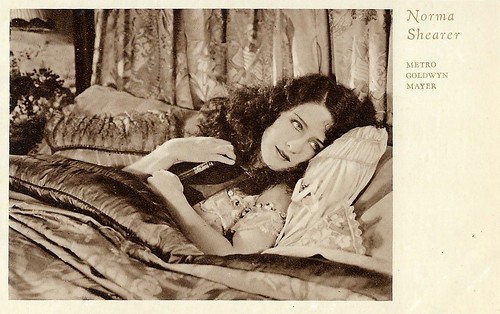
Italian postcard by Cinema-Illustrazione, series 1, no. 20. Photo: Metro-Goldwyn-Mayer. Norma Shearer in Broadway after Dark (Monta Bell, 1924).

German postcard by Ross Verlag, Berlin, no. 1587/1. Photo: Ufa. John Gilbert and Norma Shearer in He Who Gets Slapped (Victor Sjöström, 1924).
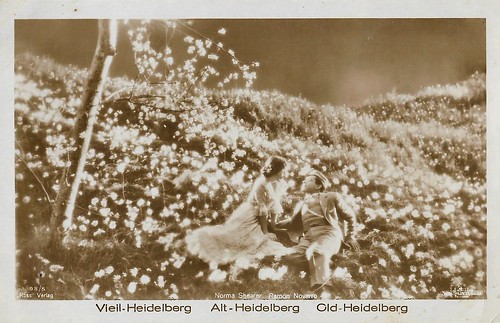
German postcard by Ross Verlag, Berlin, no. 98/5. Photo: Metro-Goldwyn-Mayer. Ramon Novarro and Norma Shearer in The Student Prince/ The Student Prince in Old Heidelberg (Ernst Lubitsch, 1927).

German postcard by Ross Verlag, no. 3880/1, 1928-1929. Photo: Metro-Goldwyn-Mayer. Norma Shearer in The Actress (Sidney Franklin, 1928).
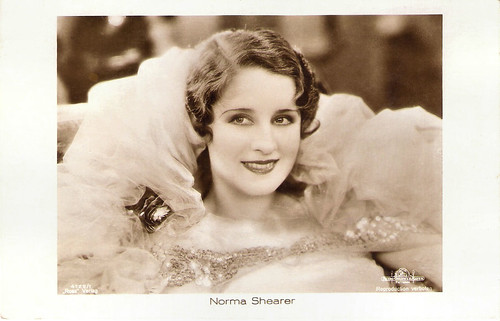
German postcard by Ross Verlag, no. 4129/1, 1929-1930. Photo: Metro-Goldwyn-Mayer.
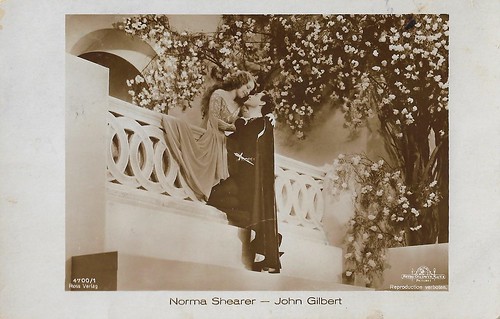
German postcard by Ross Verlag, no. 4700/1. Photo: Metro-Goldwyn-Mayer. Norma Shearer as Juliet and John Gilbert as Romeo in the early sound film The Hollywood Revue of 1929 (Charles Reisner, 1929), shot as a series of variety acts. In the film, this sequence was shot in two-color Technicolor.

German postcard by Ross Verlag, no. 5339/2, 1930-1931. Photo: Metro-Goldwyn-Mayer. Norma Shearer in Let Us Be Gay (Robert Z. Leonard, 1930).

German postcard by Ross Verlag, no. 5080/2, 1930-1931. Photo: Metro-Goldwyn-Mayer. Norma Shearer in The Divorcee (Robert Z. Leonard, 1930).
The Women
Norma Shearer's first talkie was The Trial of Mary Dugan (Bayard Veiller, 1929) with Lewis Stone. Four films later, she won an Oscar in The Divorcee (Robert Z. Leonard, 1930). She intentionally cut down film exposure during the 1930s, relying on major roles in Thalberg's prestige projects: The Barretts of Wimpole Street (1934) and Romeo and Juliet (1936) (her fifth Oscar nomination).
Thalberg died of a second heart attack in September 1936, at age 37. Norma wanted to retire, but MGM more-or-less forced her into a six-picture contract. David O. Selznick offered her the part of Scarlett O'Hara in Gone with the Wind (1939), but the public objection to her cross-eyed stare killed the deal.
She starred in The Women (1939), turned down the starring role in Mrs. Miniver (1942), and retired in 1942. Later that year she married Sun Valley ski instructor Martin Arrouge, eleven years younger than she (he waived community property rights).
From then on, she shunned the limelight. Norma Shearer passed away in 1983 in Woodland Hills, California. She was 80 and had been in very poor health in the last decade of her life. Shearer is interred at Forest Lawn, Glendale, California, USA, in the Great Mausoleum, Sanctuary of Benediction, alongside her first husband Irving Thalberg.
Shearer had two children with Thalberg. Her son Irving Thalberg Jr (1930) died in 1988 of cancer. He was a philosophy professor at the University of Illinois at Chicago. Her daughter Katherine Thalberg (1935) died in 2006 of cancer. A vegan, she headed the Society for Animal Rights in Aspen, Colorado, from 1989.

German cigarette card by Ross Verlag in the 'Moderne Schönheitsgalerie' series for Kurmark, no. 289. Photo: Metro-Goldwyn-Mayer (MGM).

German postcard by Ross Verlag, Foreign, no. 3927/2, 1928-1929. Photo: Metro-Goldwyn-Mayer.

German postcard by Ross Verlag, no. 4710/1, 1929-1930. Photo: Metro-Goldwyn-Mayer. Collection: Geoffrey Donaldson Institute.

British postcard by De Reszke Cigarettes, no. 10. Photo: M.G.M. Caption: Norma Shearer started acting in school plays at 14, and went to New York in 1920. After several small parts, obtained feminine leads which brought her a Hollywood contract with M.G.M. In Hollywood she met her husband, Irving G. Thalberg, now head of production of M.G.M. Her performance in Divorcee won her the award of the year's best performance by an actress.

British postcard by Abdulla Cigarettes, no. 27. Photo: M.G.M. Fredric March and Norma Shearer in The Barretts of Wimpole Street (Sidney Franklin, 1934).

British postcard by Real Photograph, no. 103. Photo: Metro-Goldwyn-Mayer Pictures. Leslie Howard and Norma Shearer in Romeo and Juliet (George Cukor, 1936).

French postcard by Ed. Erpé, no. 654. Photo: Metro-Goldwyn-Mayer. Norma Shearer in Marie-Antoinette (W.S. Van Dyke, Julien Duvivier, 1938).

British Real Photograph postcard in the Film Partners series, London, no. P 254. Photo: Metro-Goldwyn-Mayer. Tyrone Power and Norma Shearer in Marie Antoinette (W.S. Van Dyke, 1938).

Yugoslavian (Croatian) postcard by St. Kugli, Zagreb. Photo: Metro-Goldwyn-Mayer. Norma Shearer in Marie Antoinette (W.S. Van Dyke, 1938).

British postcard by Art Photo, no. 26. Photo: Metro-Goldwyn-Mayer.
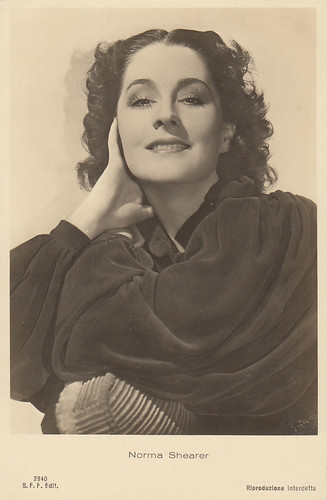
Italian postcard by B.F.F. Edit. no 2940. Collection: Marlene Pilaete. Marlene: I saw recently on TV a documentary about Anne Frank. They showed briefly the wall where Anne displayed movie star photos In fact, the photo used on this Ballerini e Fratini postcard is the same that Anne Frank choose to adorn her wall.

Spanish postcard, no. CM. -318. Photo: Metro-Goldwyn-Mayer. Melvyn Douglas and Norma Shearer in We Were Dancing (Robert Z. Leonard, 1942).
Sources: Ed Stephan (IMDb), Wikipedia, and IMDb.
1 comment:
Grat post!
Post a Comment